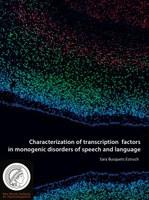What a speech deficit looks like at the cellular level

Speaking is a complex task. We cannot speak unless we learn it from other people, but we need our brain, nerves and muscles in order to do that. Our genes are crucial for building a brain that is attuned for learning this human skill. Rare mutations in the FOXP2 gene cause people to have problems with making sequences of mouth movements that are important for speech, as well as impairing other aspects of language, like grammar.
FOXP2 is active in the brain during early development. It doesn’t act alone, but interacts with additional proteins, to control with precision which other genes are active at what time and in which cells of the brain. Busquets Estruch identified seven proteins that cooperate with FOXP2 or with its close relative FOXP1. At least five of these proteins are already known to be important for patterning the developing brain. Mutations in FOXP2 that cause speech and language defects can disrupt the ways that it interacts with these protein partners. In addition, Busquets Estruch found that FOXP2 activity is regulated by a dynamic process called SUMOylation, which modifies one part of the protein, and showed that this process can also be disrupted by FOXP2 mutations. Besides these novel insights into the FOXP gene family, Busquets Estruch investigated the functional consequences of mutations in the BCL11A gene that lead to a newly characterized syndrome affecting multiple aspects of brain development, including speech development. These findings can help us further understand how a single genetic mutation is sometimes sufficient to derail our speech skills.
More information
- Sara Busquets Estruch will defend her thesis on Monday 11 June 2018 at 14:30 in the Radboud Aula.
- For more information: Sara.BusquetsEstruch [at] mpi.nl (Sara[dot]BusquetsEstruch[at]mpi[dot]nl)
Share this page